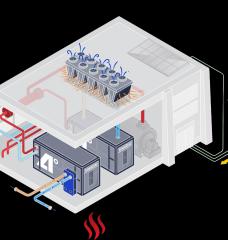
The record-breaking heat wave baking the Northwest US offers the latest example of how ill-prepared we are to deal with the deadly challenges of climate change.
The triple-digit temperatures in many areas have created soaring energy demands and strained the grid as residents crank up fans and air conditioners—in many cases newly acquired units in places that have rarely required them in the past. At least thousands of homes lost power around Portland, Seattle, and elsewhere in the last few days, creating potentially dangerous situations amid temperatures that can easily trigger heatstroke or worse.
Observers are worried there could be more widespread outages as temperatures climb higher this week and the heat wave reaches other regions, writes James Temple for the MIT Technology Review.
Read the full article at: https://www.technologyreview.com/2021/06/28/1027424/the-northwests-blistering-heatwave-underscores-the-fragility-of-our-grids/
Image credits: AP photo/Nathan Howard






